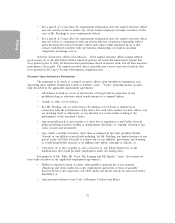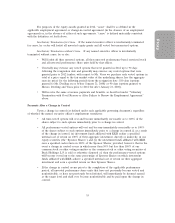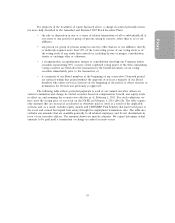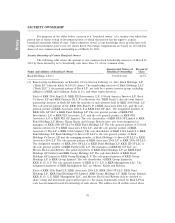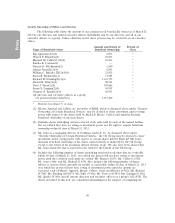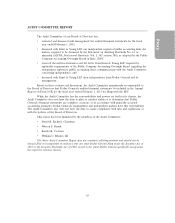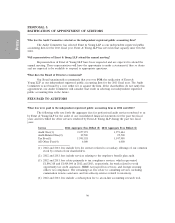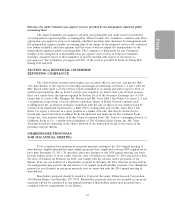Dollar General 2012 Annual Report Download - page 69
Download and view the complete annual report
Please find page 69 of the 2012 Dollar General annual report below. You can navigate through the pages in the report by either clicking on the pages listed below, or by using the keyword search tool below to find specific information within the annual report.
Proxy
PROPOSAL 2:
VOTE REGARDING CHARTER AMENDMENT
What am I being asked to approve?
Our Board of Directors is recommending that you approve an amendment to our Amended
and Restated Charter, referred to herein as the charter amendment, to provide for majority voting in
uncontested elections of directors. The disclosure below is a summary of the purpose and effect of the
charter amendment, as well as the text of the charter amendment.
What is a majority voting standard for the election of directors?
Under a majority voting standard for the election of directors, a director nominee will not be
elected unless the number of votes cast ‘‘for’’ his or her election exceed the number of votes cast
‘‘against’’ his or her election.
How are director nominees currently elected to our Board of Directors?
The Tennessee Business Corporation Act provides that, unless otherwise specified in a
company’s charter, a director is elected by a plurality of the votes cast in the election. Because our
existing charter does not specify the voting standard required in director elections, our directors
currently are elected by a plurality vote as described under ‘‘Proposal 1’’.
Why should I approve the charter amendment?
In making its recommendation, our Board of Directors and the CNG Committee carefully
considered the advantages of both majority and plurality voting standards for the election of directors,
analyzed current corporate governance trends, including the standards for voting in director elections in
place at other Fortune 500 companies, and evaluated the appropriateness of a majority voting standard
in light of our overall corporate governance structure.
Our Board of Directors and the CNG Committee also considered the benefits of retaining a
plurality voting standard, including the greater certainty that the annual election will result in a full and
duly elected Board. By contrast, a majority voting standard carries with it the possibility that (i) the
CEO or another management director might fail to be elected, (ii) our ability to comply with NYSE
listing standards and SEC requirements with respect to independent directors may be impaired, and
(iii) the triggering of a possible ‘‘change in control’’ may occur due to the failure of a majority of the
directors to be elected. Nevertheless, we believe that generally requiring directors to be elected by a
majority of the votes cast both ensures that only directors with broad acceptability among our voting
shareholders will be elected and enhances the accountability of each elected director to our
shareholders. On balance, our Board and the CNG Committee concluded that a majority vote standard
would be in our and our shareholders’ best interests and would conform our director election voting
standards with a large percentage of our peer companies.
Under a majority voting standard, shareholders will also be entitled to ‘‘abstain’’ from voting in
the election of a director. Abstentions and broker non-votes will have no effect in determining whether
the required affirmative majority vote has been obtained. In the case of a contested election, that is, an
election for which the number of nominees exceeds the number of directors to be elected, directors will
continue to be elected by a plurality of the votes cast by our shareholders entitled to vote in the
election.
62


